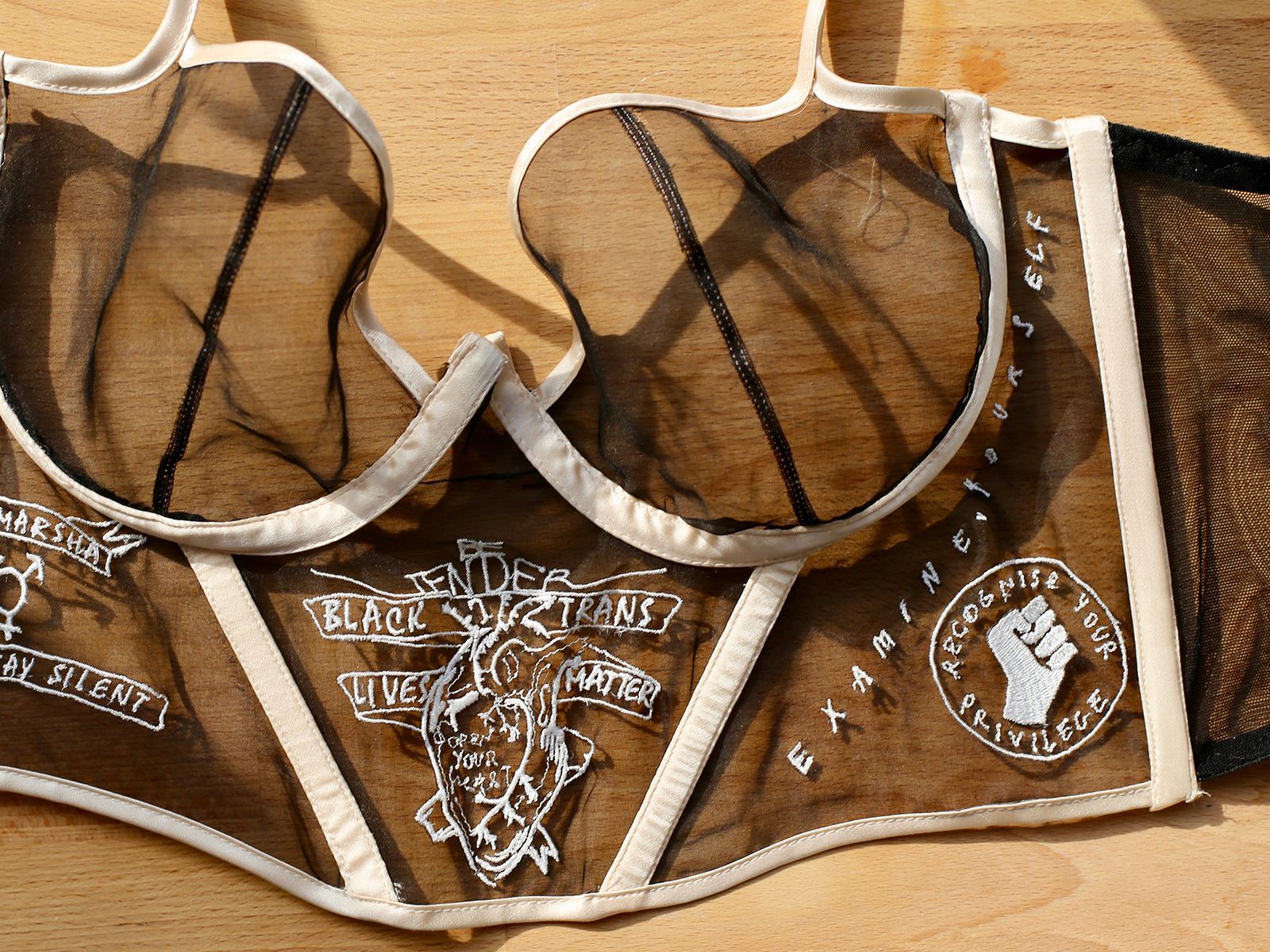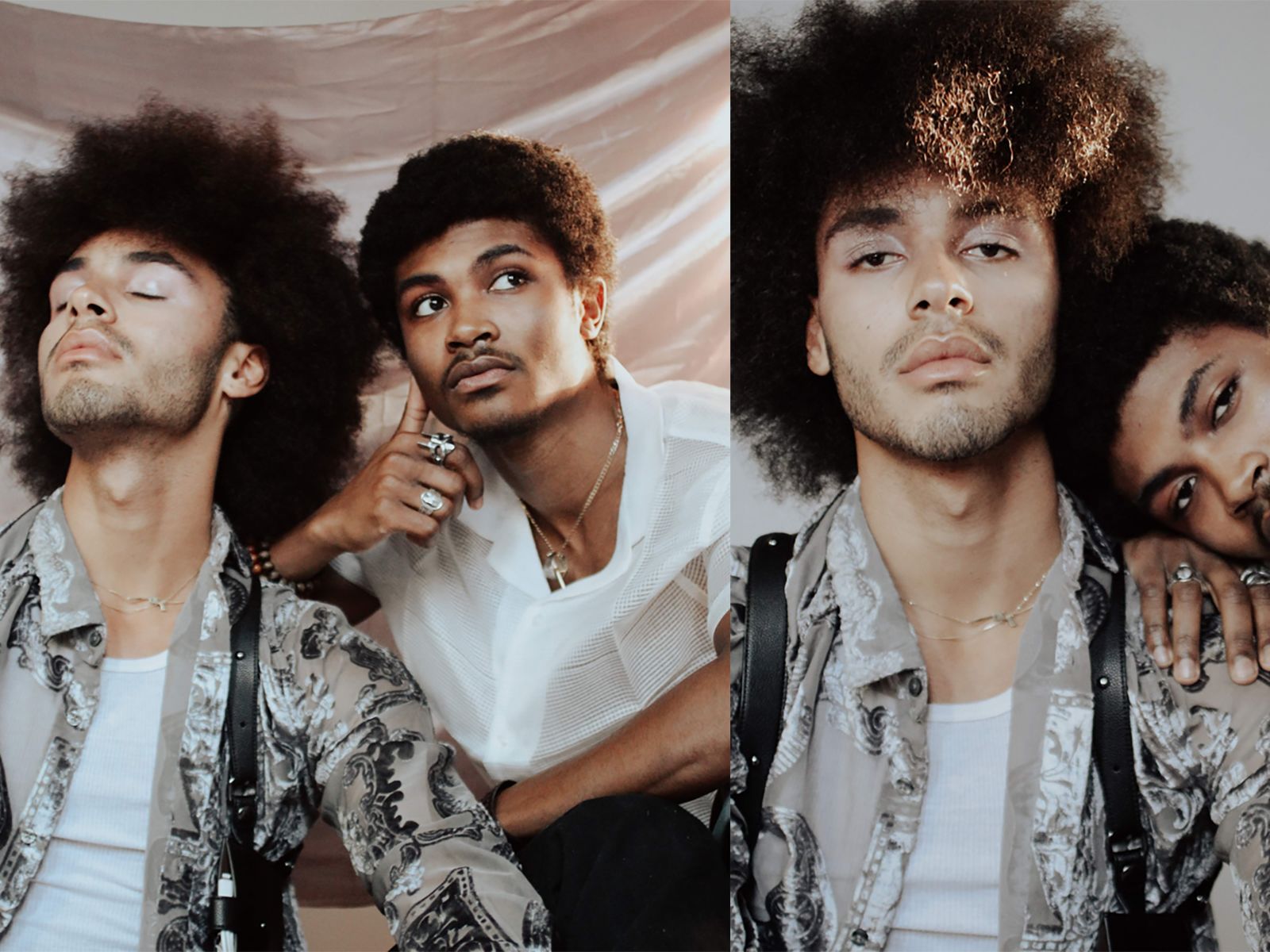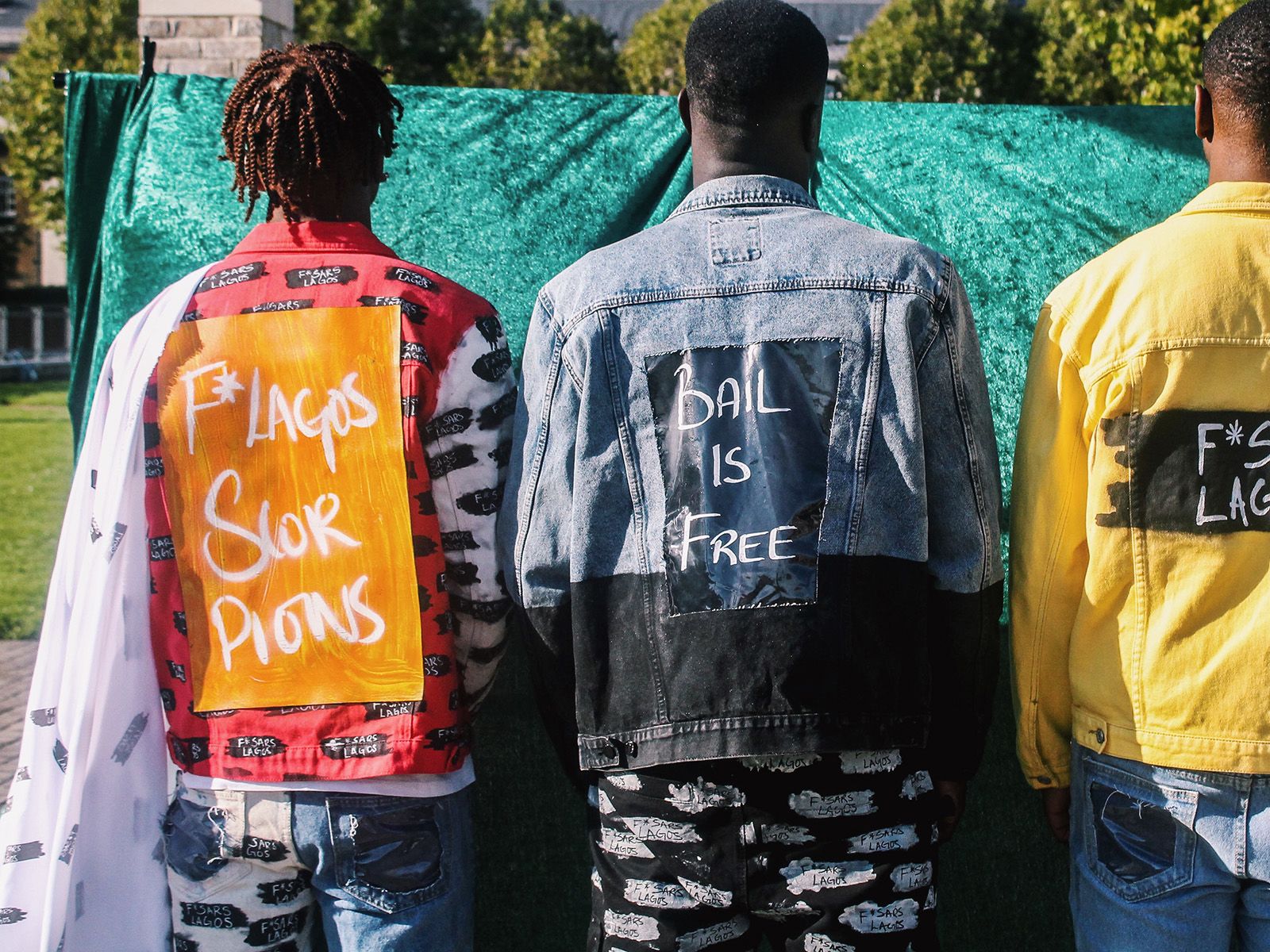
Black History Month 2021: Roisin Cummins in conversation with Petra Nogueira

- Written byRóisín Cummins
- Published date 26 October 2021

As part of LCF's Black History Month celebrations, we wanted to create a space and platform for students and alumni to have open and frank conversations around their experiences at LCF and within the fashion industry, through a series of 'in conversations' with LCF BA (Hons) Fashion Design and Technology: Womenswear alumna, Róisín Cummins.
Róisín showcased her final collection in the #LCF19 show and has since continued to use her creative ideas as a voice for change, and has worked with LCF on a variety of projects. In the first of three stories, Rosin is in conversation with Petra Raissa Nogueira, discussing her work and inspiration, the importance of Black History Month and the changes needed to create a more inclusive fashion industry.
Petra also exhibited as part of the Black History Month 2021 exhibition with Arts SU in collaboration with UAL's African Caribbean society, showcasing a selected and curated exhibition of work celebrating Black creatives.
So, Petra tell us about yourself and what you represent?
I’m Petra Raissa Nogueira, a 23-year-old visual artist and fashion designer, recently graduated from London College of Fashion. I’m a Black British woman born, bred and based in London. I have never actually put any thought to what I represent, with my focus always being on what other things represent to me, in the context of my work. I feel my identity as a thinker, dreamer, creative, producer and also being disabled, a woman of colour and second-generation immigrant, means I represent multifaceted, intersectionality and diversity, if anything.
How did you find your topic for your graduate collection and what did it teach you?
Overwhelmingly, the events of 2020 had distorted the way I thought about, understood and saw blackness, especially via social media which was very different to my normal sense of blackness. I started to brainstorm and pinpoint what I thought of my own culture, what it means to me and others, the world and what we represent in society.
Both conceptually and visually the imaginings, perceptions, state-of-being and language were different to that of the current time (but also inevitably historical discourse). I was personally missing the light that blackness was and that is when I manifested [Black is] Light as my topic but also my inspiration in life at the time.
This project has taught me so much, mostly how significant vocabulary and preservation is, and also, how art is a powerful tool in our struggle to fully form, push our humanity and theorise our own self-worth. This project clarified to me that black people are important and transformative cultural producers as we have forged unique lanes of resistance and creativity in self-definitions, that exist exclusively, in our enactable power, visibility and truth.

How does it feel to be a new LCF graduate during this current pandemic?
It feels great! The pressure and stress have been immense, in a different kind of way. I’m so glad to be done with my degree and somewhat the current pandemic but I’m also glad for the life-changing lesson it taught me. Everything is so different to me because of it! The pandemic made everything harder, nonetheless there was space there for me as a student and as a person to breathe and be resourceful.
It’s a shame that things did not go as I expected. In many aspects though, that is life and it teaches us to adapt. As a new graduate, my priorities have transformed; the way I pay attention, operate, create and maintain have adjusted for the better. I feel it has been and will continue to be a bittersweet reward.
Where do you get your inspiration from? Does it come naturally?
My inspiration comes from a range of things such my own experience, surroundings, conversations, other creatives - I can take inspiration from just about anything, but the way I have developed as a designer, my focus and interests are what I choose to inspire me.
I find myself repeatedly influenced by Afro-futurism, Black feminist thought, social material reality, conceptualism, identities and experiences. On a more personal level, Black womxn inspire me heavily, encouraging my narratives, investigations, aesthetics and designs - especially Solange and her work. I just love her powerful messages, visual language and artistic agency. Her stance on the evolving image of blackness and womanness, has been a big inspiration for me.
What is your ethic background and how do you celebrate it?
I’m from Guinea-Bissau and Cape Verde and part of the Afro-Portuguese diaspora. I celebrate my heritage and culture through the language, food, music, cultural elements within my home and with family. Also, most recently through my work.
I was going through a “discovering my roots” phase, where I uncovered a lot about my heritage, its history and importance. I did a project that celebrated this part of me, looking into personal nostalgia, family history and stories, cultural identity, ancestral traditions as well as experiences present in design. This really helped me strengthen my understanding of my identity and figure out my expression within the culture, in turn celebrating my background more and sharing it with others.
Is black history month important to you how do you view it? Do you think it's important to celebrate it within the fashion industry?
Black History Month is important to me, even though I don’t believe it should only be a month – it was created for a purpose to educate, recognise and celebrate Black people and history. With parts of society still failing us or failing to see us, I view Black History Month as setting the initiative which is really important in most settings. The significance of the Black diaspora’s contributions and achievements should not be limited to one month, and I think people doing the work to push this beyond just October, are doing the real hard work.
For me, every day is saturated with Black history (and more) however during this time I am more purposeful. I love taking part in spaces that feel more authentic, with complete representations, proper conversations and genuine support – and this tends to happen during Black History Month (in the right spaces). It would be great if the care and recognition Black creatives get in Black History Month would continue all year round, but that is rarely the case.
Within the fashion industry, there’s more work to be done than just celebrating Black History Month. Black culture impacts fashion on a huge scale, but fashion does not champion black culture in the same way. Only recently have we seen a crucial change in terms of support, representation and inclusivity, although, if the industry was more intentional and genuine in sustaining their support in black creators - in all aspects of the industry – we would have a different understanding of fashion altogether.

Do you think the fashion industry suffers with racism on a bigger scale than many realise? Do you personally see positive changes within the industry?
Most definitely, even though the world, industries and people are changing, the foundations of society have not – which directly reflects in the fashion industry. Even with the Black Lives Matter protest last year, all fashion companies were able to give was a social media post and statement against racism and maybe go as far as adding a Black person to their team – yet this does nothing to actually change systemic racism, inequalities and discrimination.
Since then, I have not seen any long-lasting change, only more people coming forward with their experiences of racism within the industry. It’s been very easy for the fashion industry to say they care about issues such as racism, without doing any tangible work to dismantle it. Just look at the fashion industries production system, that will tell you that racism runs to the very core of the mainstream industry. Companies need to ask themselves; where are the clothes made and by who? How much do they get paid? how diverse is the staff team? Do we foster an inclusive space?
Nevertheless, I do feel the fashion industry is making small steps in increasing outward representation, but this also is very slow and more sustainable positive change is needed now.
What are the biggest struggles you have had to face as a black woman in fashion?
I would say accessibility and opportunities are the biggest struggles. But then also hoping that opportunity has the space for me to be respected and seen as a whole and equal person, because it always seems to be that parts of my identity are always up for play, discussion or plainly attacked.
Being my authentic self can be extremely uncomfortable working in these fashion spaces. I find Black women have a harder and worse experience than almost everyone else; either having to prove or stand up for ourselves, face racism and sexism, not be supported like others, seen through stereotypes, constantly questioned and condemned or treated lesser.
How do you feel about black representation and celebration when it comes to fashion?
The way black people are depicted, embraced or included in the world of fashion is important, still it has not always been the best, let alone a celebration. Only in the last few years has Black representation reached an authentic place in fashion. These core contributions are due to us being the producers. With the complexity and progression of Black representation being often marginalised, misrepresented and stereotyped, black representation is not just about ‘black is beautiful or positive representation – it’s about the deeper level understanding.
There are Black creatives that are doing their thing and changing the space of Black representation. I am here for it all, because it keeps the conversation moving and expanding but also highlights the importance of Black talent in fashion that should be acknowledged and celebrated. I love how Black creators are working in their own terms, expressions and exercising their power – bringing awareness to Blackness’ depth and meaning. At last fashion is assuming a new angle regarding the ever-evolving position of Black identity; that breaks away and represents in ways that are liberating.
What are your plans since graduating?
I decided to take a year out and focus on myself and try new things, however I’ll still be researching, creating, planning, and producing. I would like to try and enter new spaces with the work I have done and possibly create a solo exhibition around my graduate collection theme. I see the next steps for my career as developing and getting more experience within the industry, hoping to use that to create my own brand business.
Is there anything you would say to young POC who are worried about joining the creative industry and feeling like there isn't any space for them at the table?
Believe in yourself! Be your biggest supporter, because at times it will get tough, people may not understand you or your work or even try to stop your progress, but at the end of the day you’re here to learn, create and be yourself (because you are unique and worthy).
Work hard, in whatever capacity you can, because even if there isn’t space for you, you can create your own space or find a space that is inviting you to sit at the table because the right creative spaces always have something to offer. Also, don’t be afraid to fail because everything is a lesson. It is all about moving forward in the direction that is right for you, and only you can make that happen.


